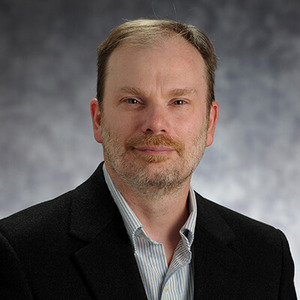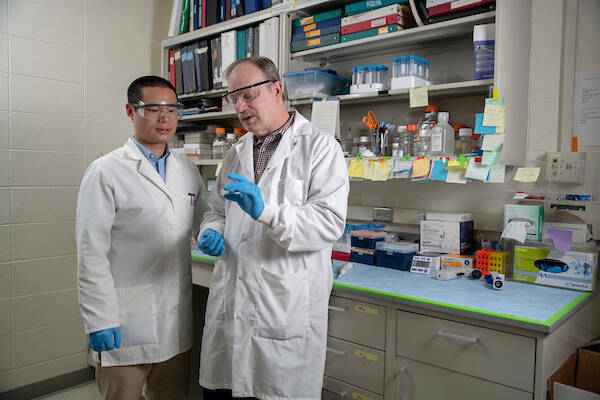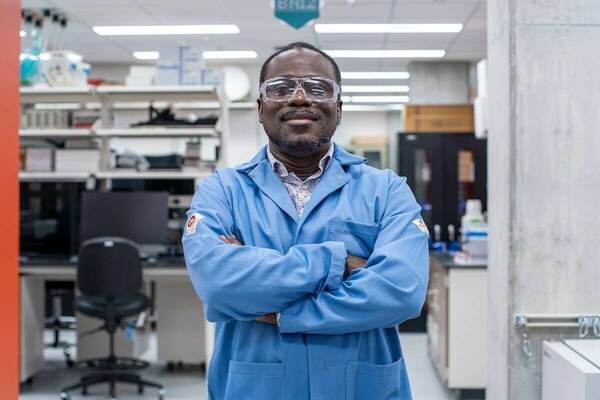Notre Dame faculty conduct translational research to address tuberculosis in lung cells
For over 8,000 years, the “white death,” tuberculosis (TB), has plagued humankind.
Its effects are described in Biblical verses and appear in mummies from Ancient Egypt. Those infected with Mycobacterium tuberculosis, which causes TB, can now be cured thanks to modern health advancements — but there is still work to be done. Limited access to care, ineffective diagnostic tools, and lack of an effective vaccine have resulted in millions still suffering and dying from TB in underserved communities every year.
But today, researchers at the University of Notre Dame are conducting translational research at the cellular level to develop advanced methods for diagnosis and prevention to help create a future without TB.

Department of Biological Sciences
Jeff Schorey, George B. Craig Jr. Professor in the Department of Biological Sciences and faculty affiliate for the Eck Institute for Global Health works with researchers in his lab to study cellular communication during TB infection.
Mycobacterium tuberculosis is an intracellular pathogen, Schorey explains. “When you breathe it in, it is transmitted not only into your lungs but into the cells in your lungs.” He compares intracellular pathogens to a closed door in a room. “If you have your door closed, people walking down the hall can’t see you. We might expect the same with TB, which would make it less likely for the immune system to recognize and respond to it.”
Except, the immune system can identify TB within each cell, and offers a protective response for the majority of people. Schorey’s lab is studying one of the mechanisms by which this response is triggered. “It turns out,” he says, “that during an infection of a cell, some of the components of TB are released within the macrophage — white blood cells that can be found within the lungs.” The components are then incorporated into membrane vesicles, which play a key role in how cells communicate with each other throughout the body. The result of this packaging the TB components into the membrane vesicles is better detection by the immune system.
The Schorey Lab was one of the first labs to explore the relationship between the immune system and membrane vesicles. The discovery of this connection is changing how TB is diagnosed.
The current diagnostic method for identification requires sputum samples, samples of mucus collected from an active cough of someone infected with TB. “This is problematic,” Shorey says, because “many people, such as HIV patients, children, and even adults who are malnourished, may not generate a sputum.” To address this challenge, his team is developing a comprehensive diagnostic assay that uses blood samples to identify mycobacteria RNA and proteins within the membrane vesicles. The analysis will aid in recognizing latent TB infection from individuals with an active, transmissible disease. It may also help researchers to develop a vaccine with a robust immune response.

in his lab in Galvin Life Science.
The current TB vaccine is administered to infants and young children in countries where TB is prevalent but does not provide protection from the disease once it has been transmitted inside the lungs. Shorey and others hope that by using a unique way of packaging mycobacterial proteins, a consistent protective immune response can be achieved, which can then be developed into a vaccine.
“Every day, in underserved communities, tuberculosis infects more than 20 people every minute and kills roughly 3500 people. The University of Notre Dame is committed to supporting world-class research that can stop the spread of tuberculosis in these communities, and around the world,” says Dr. Bernard Nahlen, director of the Eck Institute for Global Health and professor of biological sciences. “Supporting the work of Jeff’s team moves us one step closer towards this goal.”
The 2024 World Health Organization’s World Tuberculosis Day slogan is, “Yes! We can end TB.” To end the disease, Schorey hopes that each observation can contribute to the larger picture of prevention and treatment.
“I think of science as a jigsaw puzzle,” he says. “The entire science community, even people who are doing research in cancer or in other fields, may provide a piece that you can put into your puzzle.’”
Future research will apply the observations from The Shorey Lab to high burden countries for tuberculosis. Joshua Ongalo, a current Ph.D. student working within The Schorey Lab, will use lab investigations to target projects within his home country of Kenya in 2024 and 2025.
For more information about tuberculosis research and other global health projects supported by the Eck Institute for Global Health, please visit the website.
Contact:
Christine Grashorn, Communications Specialist
Notre Dame Research / University of Notre Dame
cgrashor@nd.edu / 574.631.4856
research.nd.edu / @UNDResearch
About the Eck Institute for Global Health
The Eck Institute for Global Health (EIGH), an integral part of Notre Dame Research, builds on the University’s historical strength in infectious disease research, including vector-borne diseases, while broadening the interdisciplinary expertise into other key global health areas including maternal, newborn, and child health (MNCH); community health; mental health; nutrition and non-communicable diseases; the environment and health; health analytics and technologies; and health systems and organizations. Our team of interdisciplinary researchers and their students holistically address health disparities around the world. EIGH faculty affiliates recognize health as a fundamental human right and promote research, training, and service to advance health standards for all people, especially those in resource-poor countries who are disproportionately impacted by preventable diseases. The EIGH is training the next generation of global health researchers and leaders through undergraduate, Master of Science in Global Health, doctoral, and postdoctoral programs.
Originally published by at globalhealth.nd.edu on March 24, 2024.
Latest Research
- “Contagious capitalism”: Keough School Dean Mary Gallagher shares research insights on law, labor and justice in ChinaMary Gallagher, the Marilyn Keough Dean of the Keough School of Global Affairs, delivered the fifth annual Justice and Asia Distinguished Lecture at the school’s Liu Institute for Asia and Asia Studies on April 8, drawing on her research expertise to share insights on law, labor and justice in China.
- Thirteenth Annual Harper Cancer Research DayRohit Bhargava The 13th annual…
- Two Notre Dame historians win Guggenheim fellowshipsTwo faculty members in the University of Notre Dame’s College of Arts & Letters have been awarded fellowships from the John Simon Guggenheim Memorial Foundation as part of its 100th class of honorees.
- Castruccio named Fellow of American Statistical AssociationStefano Castruccio, Notre Dame Collegiate Associate Professor in the Department of Applied and Computational Mathematics and Statistics (ACMS), has been named an elected fellow of the American…
- Putting 10 pounds in a five-pound bag: a graduating senior reflects on majoring in global affairs…
- As the Harper Cancer Research Institute’s first-ever associate director for translational research, Herman Sintim is working to turn discoveries into new tools for fighting cancerSintim brings a wealth of expertise in both basic science and entrepreneurship to his new role.













